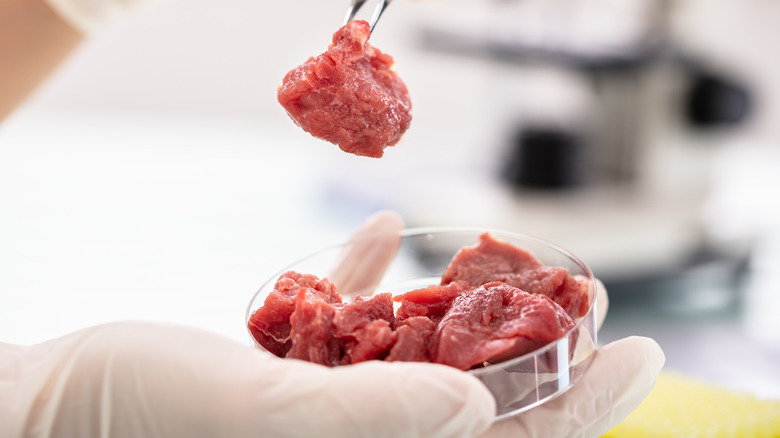Lab-Grown Steaks Are Totally Kosher
Lab-grown meat — "also known as cultured, cultivated, cell-based, or clean meat," per The Humane League — is fast getting closer to your dining table. Made by harvesting cells from a living animal (using anesthesia) and cultivating them to form pieces of meat that look and taste a lot like the steaks, hamburgers, and fish fillets we've been eating for generations, lab grown meat does not require animals to be reared, confined, or slaughtered. This means that scientists can harvest stem cells from a cow, place them in a petri dish, provide it with nutrients like amino acids and carbohydrates, and end up with beef, explains GCFGlobal.
It may seem futuristic, but lab-grown meat got FDA approval this past fall, meaning it will soon become commonplace to purchase it from your local grocery. However, like all scientific breakthroughs that touch on sensitive areas of human life like food and cultural traditions, lab-grown meat also requires other forms of approval to go mainstream: that from social, cultural, and religious institutions. Thanks to a recent declaration by the Chief Rabbi of Israel, one lab-grown meat company's products have become the first of their kind to be deemed kosher, and therefore fit for consumption under Jewish law.
Meat for people with different food traditions
Israeli Chief Rabbi David Baruch Lau just recognized Aleph Farms' lab-cultivated steaks as kosher, according to a press release from the lab-grown meat company. Before going on the market later this year, Aleph Farms will be able to seek a kosher certificate for its products and production facility in Rehovot, Israel. Aleph Farms CEO Didier Toubia called the kosher designation "meaningful" for the lab-grown meat industry at large, as "it sets a foundation for an inclusive public discourse about the intersection of tradition and innovation in our society." Toubia also pointed out that the ruling opens up the food category to "people with different culinary traditions." This includes groups with long established religious rubrics around the consumption of meat or slaughtering of animals, such as Hindus and Muslims.
The rabbi's declaration comes at a time when the market size of lab-grown meat is forecast to soar to about $2 billion by 2035, with beef leading the way. The ruling takes the discourse on whether lab-grown meat is the future of food a notch higher, suggesting that the category could appeal to a much wider audience beyond the science-savvy.

